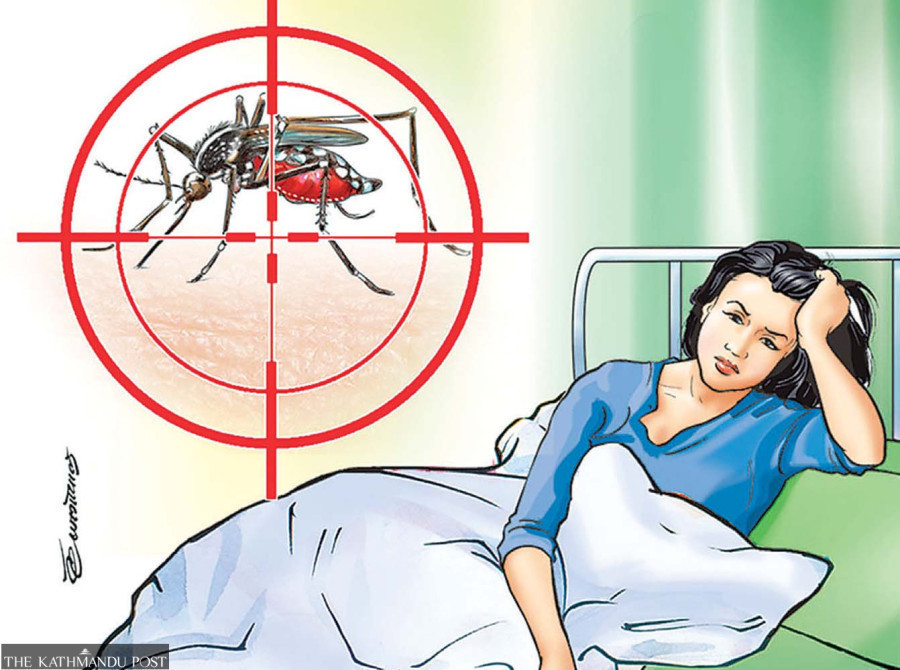Health
As dengue control falters, focus shifts to individual cases
1,175 infections reported in 72 districts so far this year.
Arjun Poudel
As all efforts to control the vectors spreading the dengue virus have failed, health authorities in Nepal have shifted focus to case management.
As there is no specific treatment for dengue, officials said they are planning to train doctors to provide supportive care to seriously ailing dengue patients.
“We have been working to train doctors serving at state-run health facilities to treat dengue patients,” said Dr Yadu Chandra Ghimire, director at the Epidemiology and Disease Control Division. “We hope the training will help doctors manage cases more effectively.”
Dengue is a viral disease transmitted by female Aedes aegypti and Aedes albopictus mosquitoes. The same vectors also transmit chikungunya, yellow fever, and Zika virus, according to the World Health Organisation.
According to data provided by the Epidemiology and Disease Control Division, at least 1,175 people from 72 districts have been infected with the dengue virus since January this year. Among the 72 districts that reported dengue outbreaks, Kathmandu has the highest number of cases: 122.
Public health experts say reported cases could be just the tip of the iceberg, as around 80 percent of those infected are asymptomatic.
Many people infected with dengue show mild symptoms and do not need treatment or can be treated with paracetamol at home.
Nepal reported its first dengue case in a foreigner in 2004 in the Chitwan district. Since then, increasing numbers of dengue infections have been reported from many districts, including major dengue outbreaks.
Last year, at least 20 persons died, and more than 52,000 were infected by the virus, which had spread to all 77 districts.
In 2022, a total of 88 people died, and over 54,000 were infected by the virus across the country. During that period, hospitals in the Kathmandu Valley were overwhelmed with dengue patients, and pharmacies ran out of paracetamol, the most widely used medicine to treat fever.
In 2019, the disease killed at least six people and more than 16,000 were hospitalised across the country. The virus had spread to 68 districts at the time.
Though the post-monsoon period is considered the dengue epidemic season, the deadly disease has already become endemic in Nepal, as the outbreak of the virus is reported every month including in the winter months.
Health authorities in Nepal claimed that lessons from managing Covid cases would help them combat other outbreaks, but the massive infections and spread of the dengue virus before the onset of the monsoon cast doubt on these claims.
“Every year, scores die and hundreds of thousands get infected from the dengue virus, but no agency in the country is doing much on disease prevention,” said Dr Baburam Marasini, a public health expert. “There are three tiers of government in the country, and the relevant agency in each government—federal, provincial and local—shifts responsibility to another. When you ask the agency under the local level, they say they are not there to kill mosquitoes.”
Experts say health authorities have done little to cut down on the risks, except counting the number of infected people and issuing statements. The public, too, has become less vigilant about dengue infections, they say
According to entomologists, reducing the spread of the dengue virus is impossible without coordinated efforts from all relevant agencies and individuals.
“Several preemptive measures, including a search-and-destroy campaign of mosquito breeding sites, are necessary to curb the spread of the virus,” said Sishir Panta, an entomologist. “People should be made aware of the risks, so awareness drives should be launched. Authorities should deploy community workers to inspect households to find and destroy mosquito breeding grounds.”
Experts say this is the right time to prepare for and prevent possible outbreaks.
Waiting for a massive outbreak would be a big mistake, they say.
Health ministry officials said they have alerted all related agencies to the risk of a dengue outbreak.
Dengue-transmitting mosquitoes breed in clean water and bite people in daylight. Uncovered water tanks and discarded objects, such as plastic cups and bottles, could be breeding grounds for these mosquitoes.
Symptoms include mild to high fever, severe muscle pain, rashes, severe headache, and pain in the eyes. Patients with these symptoms are advised to seek immediate treatment. While there is no specific cure for the disease, early detection and proper medical care can prevent death.




 25.96°C Kathmandu
25.96°C Kathmandu















